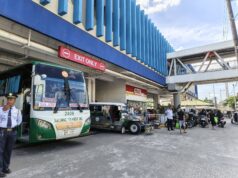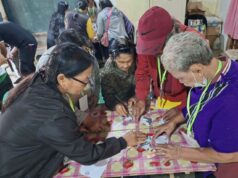When Ferdinand Marcos, Jr. takes his oath of office on his inauguration day as the next Philippine president, apart from remembering his inaugural address, he is expected to be mindful of what he is going to swear to do while in office– at least in the next 6 years, barring Charter Change which has been tried in the past but failed.
Incoming Sen. Robin Padilla and other Senate newbies have their roles cut out for them, which former Sen. Franklin Drilon frankly tells them not to take lightly. The Constitution is clear and unequivocal on what his position as the highest official of the land entails. There are four things:1) protect and defend the Constitution 2) execute the laws 3) do justice to everyone and 4) serve the nation.
The job has never been more daunting because ,unfortunately, 1) there is no school for presidents and 2), like a paratrooper, he has to learn the important lessons on the way down. Being the son of a former president dictator may help, if it will not hamper or hurt him.
It is axiomatic that presidents are elected to solve problems, apart from the undying (universal) optimism, or folly, if you will, of voters that they will keep their promises. BBM has a lot on his plates, problems and promises alike. There are also the needling, messy “leftovers” of his predecessor, which he can repudiate or, worse, repeat. Success or failure can come from succession.
In his book ‘The Choice’, American journalist Bob Woodward wrote, quoting another author: “There is a “field” that comes with being the president. The job brings a historical procession of previous presidents, of the greatness of the office, and the country and its struggle.” From that, Woodward recalled the author saying the president could construct a vision of a better society or “ the possible society”.
What is BBM’s vision using these parameters as a paradigm? How does he see himself and the future in light of the past and the present? He may consciously construct the Filipino society in the next six years or beyond in terms of his promise — “the golden age”—and the huge, unprecedented
challenges the country is facing at the moment. His familiar choices for his Cabinet is reflective of his campaign nostalgia for a so-called “golden age”. Choosing the nonbiodegradable Juan Ponce Enrile, who has defied time and legal trials , as his presidential legal counsel tells a lot about his nostalgia and his utopia as well.
With problems, there is the economy in shambles `. BBM’s economist can pick their poison: beat the inflation or fight the rising prices. China is apparently in on wait-and see posture before its next move in the West Philippine Sea. The International Criminal Court is set to resume its investigation on the alleged “war against humanity” of soon- to -be former President Duterte, his big-time benefactor. This will be a litmus test on the predecessor-successor’s quid pro quo. The case against former Sen. Leila de Lima and other issues concerning the judiciary are` also pressing. Democracy is continually threatened while respect for human rights remain a major issue.
With promises, BBM should remind himself of how he missed the so-called “ golden age” in his father’s time, impliedly looking forward to it during his administration. Part of the package, among other olden” campaign incentives, is bringing back the price of rice to P20 per kilo. The audacity of such a promise is astounding and mind-boggling.
Matching the four to-do Constitutional agenda, BBM may translate them into four moral principles: righteousness, justice, kindness and peace. In a perfect world, these are axiomatic. In an imperfect world, and with China breathing down our neck, good luck. “Never fear to negotiate”, John F. Kennedy said in his inaugural speech,” but never negotiate out of fear”.
BBM’s greatest enemy may be himself. His reputation, or what passes for it, precedes him. Political pundits may also view him a beneficiary of post modernism, where integrity is less important By this, it means he may be leading in a time of post moral, post truth , post decency political culture. In short, a lowering of expectations. His predecessor will likely make it in history as one who may have lowered the bar in terms of moral and democratic leadership.
BBM tows a heavy baggage as it were, political and otherwise. First off, he is the son of a former dictator rudely thrown out power by his own people in a peaceful revolt. He may have been restored to his late father’s former post, there are many questions that remain unsettled. Tax issues against him and his late father’s estate continue to hound him and his family. He’s not exactly enamored of press freedom. The laundry list is long and vertiginous.
He may want to seriously pay attention to his incoming head of the Bureau of Internal Revenue, Lilia Guillermo. Her simple word of advice, which she told media she would tell the president face-to-face, is to be a model president. By that, she probably meant, first and foremost, BBM has to pay his taxes correctly and on time, including the P203 billion that ballooned from the original P23 billion that the Supreme Court had ordered him and the other co-administrator of the Marcos estate to settle a long, long time ago.
“Public servants are teachers”, former U.S. Sen. John Ashcroft once said. “ The teaching example of our leaders is profoundly important”. What should BBM teach us then? He knows the answer, but the answer remains to be seen although the BIR’s chief simple advice of being a model public servant is sufficient and specific enough.





